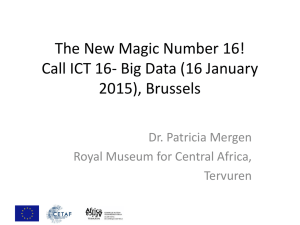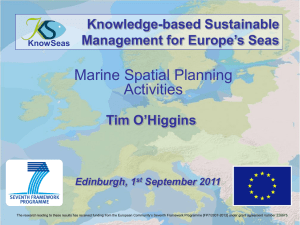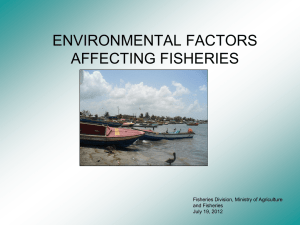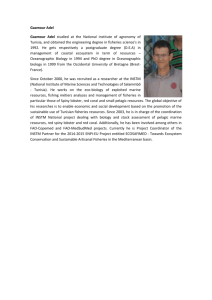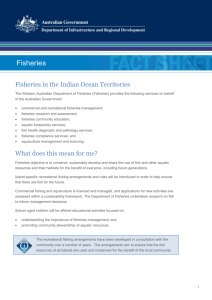COR-2015-05241-00-00-PA-TRA
advertisement
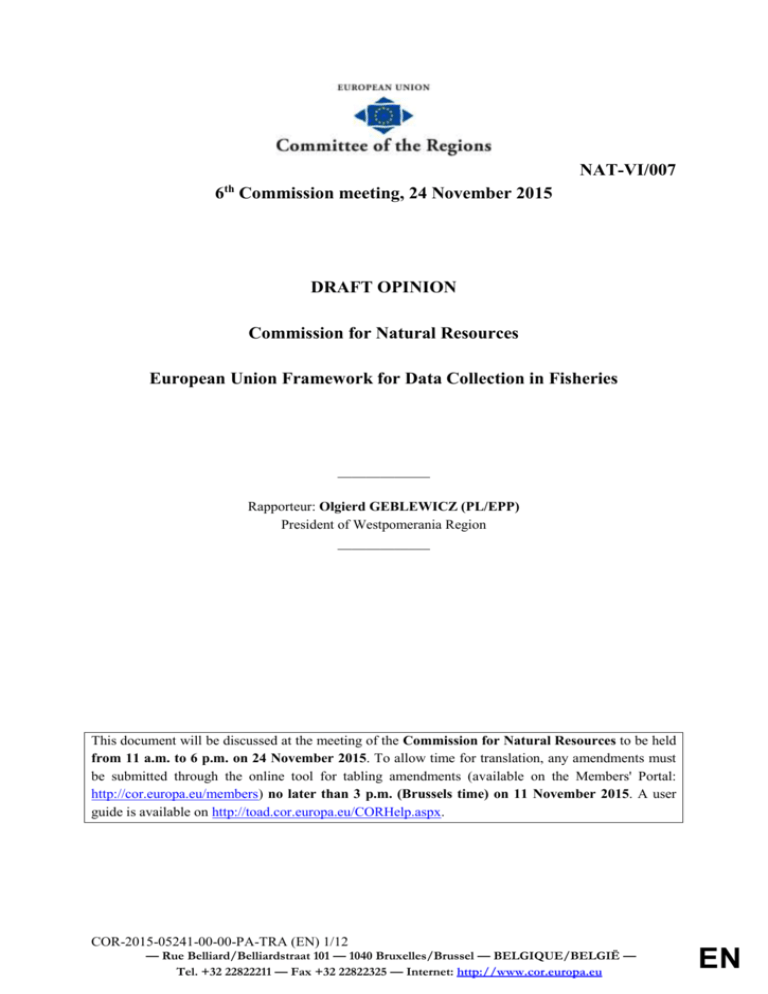
NAT-VI/007 th 6 Commission meeting, 24 November 2015 DRAFT OPINION Commission for Natural Resources European Union Framework for Data Collection in Fisheries _____________ Rapporteur: Olgierd GEBLEWICZ (PL/EPP) President of Westpomerania Region _____________ This document will be discussed at the meeting of the Commission for Natural Resources to be held from 11 a.m. to 6 p.m. on 24 November 2015. To allow time for translation, any amendments must be submitted through the online tool for tabling amendments (available on the Members' Portal: http://cor.europa.eu/members) no later than 3 p.m. (Brussels time) on 11 November 2015. A user guide is available on http://toad.cor.europa.eu/CORHelp.aspx. COR-2015-05241-00-00-PA-TRA (EN) 1/12 — Rue Belliard/Belliardstraat 101 — 1040 Bruxelles/Brussel — BELGIQUE/BELGIË — Tel. +32 22822211 — Fax +32 22822325 — Internet: http://www.cor.europa.eu EN Reference document Proposal for a regulation of the European Parliament and of the Council concerning the establishment of a Union framework for the collection, management and use of data in the fisheries sector and support for scientific advice regarding the Common Fisheries Policy (recast) – COM (2015) 294 final COR-2015-05241-00-00-PA-TRA (EN) 2/12 Draft opinion of the Commission for Natural Resources – European Union Framework for Data Collection in Fisheries I. RECOMMENDATIONS FOR AMENDMENTS Amendment 1 Recital 10 Text proposed by the Commission (10) The definition of "end-users" should be aligned with the definition of "end-users of scientific data" appearing in Regulation (EU) No 1380/2013 and cover also scientific bodies with an interest in the environmental aspects of fisheries management. CoR amendment (10) The definition of "end-users" should be aligned with the definition of "end-users of scientific data" appearing in Regulation (EU) No 1380/2013 and with the STECF recommendations and cover also scientific bodies with an interest in the environmental aspects of fisheries management. Reason The definition of “end-user” is too broad, especially when end-users can define data-need. Therefore, data end-users should be divided into those end-users that can define data-need and those that only can get access to data. In its review of DC MAP (ref. STECF Report on Review of DC MAP-(STECF-13-06) Part 1 page 6 and in its Report on DCF Revision Part 4 (STECF-14-07) Pages 43-45 and p.106, the STECF suggests the following three types of end-users: Type 1: Main end users for whom the DCF was designed, including the Commission, any bodies such as ICES and STECF designated by the Commission to provide them with recurrent advice directly supporting CFP decision-making, and other fishery management bodies such as RFMOs and GFCM using DCF data to implement their fishery management policies. Type 2: Other bodies such as Advisory Councils or subcontractors from whom the Commission may request advice or analysis based on DCF data. Type 3: All other bodies such as NGOs, Fishermen’s organisations and Universities with an interest in using DCF data for their own purposes. All three types of end-users can get access to data but only Type 1 and type 2 can contribute to the data-need procedures. Amendment 2 Recital 14 Text proposed by the Commission (14) Data needs for fisheries policies not directly regulated by Regulation (EU) No 1380/2013, such as those relating to Regulation (EC) No 1100/2007 and Regulation (EC) No 2347/2002, should also be covered by this Regulation COR-2015-05241-00-00-PA-TRA (EN) 3/12 CoR amendment (14) Data needs for fisheries policies not directly regulated by Regulation (EU) No 1380/2013, such as those relating to Regulation (EC) No 1100/2007, Regulation (EC) No 812/2004 and Regulation (EC) No 2347/2002, should also be covered by this Regulation Reason To be consistent with Regulation (EC) 508/2014 Art 77c Amendment 3 Article 6 National work plans Text proposed by the Commission 1. Without prejudice to their current data collection obligations under Union law, Member States shall collect data within the framework of an operational programme, as referred to in Article 18 of Regulation (EU) No 508/2014, and a work plan drawn up in accordance with the multi-annual Union programme and pursuant to Article 21 of Regulation (EU) No 508/2014. 2. Member States' work plans shall contain a detailed description of the following: (a) the frequency by which the data will be collected; (b) the source of the data, the procedures and methods to collect and process the data into the data sets that will be provided to end-users; (c) the quality assurance and quality control framework to ensure adequate quality of the data in accordance with Article 13; (d) how and when the data are needed; (e) the international and regional cooperation arrangements, including bilateral and multilateral agreements concluded to achieve the objectives of this Regulation; and (f) how the international obligations of the Union and its Member States have been taken into account. 3. In preparing its work plan, each Member State shall coordinate its efforts with other Member States, notably in the same marine region, to ensure sufficient and efficient coverage and avoid duplication of data collection activities. 4. Each Member State shall ensure compliance of its work plan with the applicable joint recommendations by the Regional Co-ordination Groups where such joint recommendations have been approved by the Commission in the form of COR-2015-05241-00-00-PA-TRA (EN) 4/12 CoR amendment 1. Without prejudice to their current data collection obligations under Union law, Member States shall collect data within the framework of an operational programme, as referred to in Article 18 of Regulation (EU) No 508/2014, and a work plan drawn up in accordance with the multi-annual Union programme and pursuant to Article 21 of Regulation (EU) No 508/2014. 2. Member States' work plans shall contain a detailed description of the following: (a) the frequency by which the data will be collected; (b) the source of the data, the procedures and methods to collect and process the data into the data sets that will be provided to end-users; (c) the quality assurance and quality control framework to ensure adequate quality of the data in accordance with Article 13; (d) how and when the data are needed as defined by main end-users; (e) the international and regional cooperation arrangements, including bilateral and multilateral agreements concluded to achieve the objectives of this Regulation; and (f) how the international obligations of the Union and its Member States have been taken into account. 3. In preparing its work plan, each Member State shall coordinate its efforts and cooperate with other Member States, notably in the same marine region, to ensure sufficient and efficient coverage and avoid duplication of data collection activities. 4. Each Member State shall ensure compliance of its work plan with the applicable joint recommendations by the Regional Co-ordination Groups where such joint recommendations have a regional work plan in accordance with Article 8. been approved by the Commission in the form of a regional work plan in accordance with Article 8. Reason This regulation proposes that data main end-users should be involved in defining data needs and should be able to launch data calls when needed. Therefore, main end-users should be able to define data needs and launch data calls at any time. At the time when Member States should be drawing up work plans, data needs and the dates for data calls, the deadlines for having finalised the data for use by the main end-users may not be known. It is important that Member States in the same region not only coordinate but also actively cooperate, cf. clause No 46 in the Basic Regulation (“Member States should cooperate with each other and with the Commission to coordinate data collection activities”). This should be also compatible with the title and content of Art 8 of the draft regulation under consideration. Amendment 4 Article 7 National correspondents Text proposed by the Commission 1. Each Member State shall designate a national correspondent and shall inform the Commission thereof,. The national correspondent shall serve as the focal point for exchange of information between the Commission and the Member State regarding the preparation and implementation of the work plans. 2. The national correspondent shall furthermore carry out the following tasks: (a) coordinate the preparation of the annual report referred to in Article 10; (b) ensure the transmission of information within the Member State; and (c) ensure attendance of relevant experts in meetings organized by the Commission and participation in the relevant Regional Coordination Groups referred to in Article 8. 3. If several bodies in a Member State are participating in the implementation of the work plan, the national correspondent shall be responsible for the co-ordination of that work. COR-2015-05241-00-00-PA-TRA (EN) 5/12 CoR amendment 1. Each Member State shall designate a national correspondent and shall inform the Commission thereof. The national correspondent shall serve as the focal point for exchange of information between the Commission and the Member State regarding the preparation and implementation of the work plans. 2. The national correspondent shall furthermore carry out the following tasks: (a) coordinate the preparation of the annual report referred to in Article 10; (b) ensure the transmission of information within the Member State; and (c) ensure attendance of relevant experts in meetings organized by the Commission and participation in the relevant Regional Coordination Groups referred to in Article 8. (d) ensure, where necessary, consultation with local or regional authorities from regions where fisheries play an important role. 3. If several bodies in a Member State are participating in the implementation of the work plan, the national correspondent shall be responsible for the co-ordination of that work. Reason As local and regional authorities have a good knowledge of fisheries and are involved in managing this sector, they need the necessary information on how the sector is performing. They also play a very important role in implementing Regulation (EC) 508/2014, which is crucial for fisheries. Amendment 5 Article 8 Coordination and cooperation Text proposed by the Commission 1. In accordance with Article 25 of Regulation (EU) No 1380/2013, Member States shall coordinate their actions with other Member States and make every effort to coordinate their actions with third countries having sovereignty or jurisdiction over waters in the same marine region. For this purpose, a Regional Coordination Group shall be established by the relevant Member States in each Marine Region. 2. Regional Co-ordination Groups shall consist of experts from Member States, the Commission, and relevant end-users of data. 3. Regional Co-ordination Groups shall draw up and agree on rules of procedures for their activities. 4. Regional Co-ordination Groups shall coordinate with each other and with the Commission where issues affect several regions. 5. Regional Co-ordination Groups may prepare joint recommendations in the form of a draft of a regional work plan regarding procedures, methods, quality assurance and quality control for collecting and processing of data as referred to in paragraph 2(a) and (b) and paragraph 4 of Article 5, and regionally coordinated sampling strategies. In doing so, the Regional Co-ordination Groups shall take into account the opinion of STECF when relevant. Those recommendations shall be submitted to the Commission, which shall verify whether the draft joint recommendations are compatible with the provisions of this Regulation and with the Union's multiannual programme and, if so, approve the regional work plan by way of implementing acts. 6. Where regional work plans are approved by the COR-2015-05241-00-00-PA-TRA (EN) 6/12 CoR amendment 1. In accordance with Article 25 of Regulation (EU) No 1380/2013, Member States shall coordinate their actions with other Member States and make every effort to coordinate their actions with third countries having sovereignty or jurisdiction over waters in the same marine region. For this purpose, a Regional Coordination Group shall be established by the relevant Member States in each Marine Region. 2. Regional Co-ordination Groups shall consist of experts from Member States, the Commission, relevant end-users of data as well as representatives of local or regional authorities from regions where fisheries play an important role. 3. Regional Co-ordination Groups shall draw up and agree on rules of procedures for their activities. 4. Regional Co-ordination Groups shall coordinate with each other and with the Commission where issues affect several regions. 5. Regional Co-ordination Groups may prepare joint recommendations in the form of a draft of a regional work plan regarding procedures, methods, quality assurance and quality control for collecting and processing of data as referred to in paragraph 2(a) and (b) and paragraph 4 of Article 5, and regionally coordinated sampling strategies. In doing so, the Regional Co-ordination Groups shall take into account the opinion of STECF when relevant. Those recommendations shall be submitted to the Commission, which shall verify whether the draft joint recommendations are compatible with the provisions of this Regulation and with the Union's multiannual programme and, Commission, they replace the relevant parts of the work plans drawn up by each Member State. Member States shall update their work plans accordingly. 7. The Commission may adopt implementing acts laying down rules on procedures, format and timetables for the submission and approval of regional work plans, as referred to in paragraph 5. Those implementing acts shall be adopted in accordance with the examination procedure referred to in Article 24 (2). if so, approve the regional work plan by way of implementing acts. 6. Where regional work plans are approved by the Commission, they replace the relevant parts of the work plans drawn up by each Member State. Member States shall update their work plans accordingly. 7. The Commission may adopt implementing acts laying down rules on procedures, format and timetables for the submission and approval of regional work plans, as referred to in paragraph 5. Those implementing acts shall be adopted in accordance with the examination procedure referred to in Article 24 (2). Reason As local and regional authorities have a good knowledge of fisheries and are involved in managing this sector, they need the necessary information on how the sector is performing. They also play a very important role in implementing Regulation (EC) 508/2014, which is crucial for fisheries. Amendment 6 Article 16 Procedure for ensuring availability of detailed and aggregated data Text proposed by the Commission 1. Member States shall set up adequate processes and electronic technologies to ensure an effective application of Article 25 of Regulation (EU) No 1380/2013, and shall refrain from any unnecessary restrictions to the widest possible dissemination of detailed and aggregated data. 2. Member States shall ensure appropriate safeguards, in case data include information relating to identified or identifiable natural persons. The Commission shall be empowered to adopt, in accordance with Article 23, delegated acts defining appropriate safeguards to be used when dealing with such information. 3. Member States shall ensure that relevant detailed and aggregated data are updated and made available to end-users within one month from the receipt of a request for those data. In case of requests made by other interested parties, Member States shall ensure that the data are updated and made available within two months COR-2015-05241-00-00-PA-TRA (EN) 7/12 CoR amendment 1. Member States shall set up adequate processes and electronic technologies to ensure an effective application of Article 25 of Regulation (EU) No 1380/2013, and shall refrain from any unnecessary restrictions to the widest possible dissemination of detailed and aggregated data. 2. Member States shall ensure appropriate safeguards, in case data include information relating to identified or identifiable natural persons. The Commission shall be empowered to adopt, in accordance with Article 23, delegated acts defining appropriate safeguards to be used when dealing with such information. 3. Member States shall ensure that relevant detailed and aggregated data are updated and made available to end-users within one month from the receipt of a request for those data. In case of requests made by other than main endusers, Member States shall ensure that the data are updated and made available within two from the receipt of a request for those data. 4. Where detailed data are requested for scientific publication, Member States may, in order to protect the professional interests of data collectors, require that the publication of data be delayed by 3 years from the date to which the data refer. Member States shall inform the endusers and the Commission of any such decision and of the reasons therefor. months from the receipt of a request for those data. 4. Where detailed data are requested for scientific publication, Member States may, in order to protect the professional interests of data collectors, require that the publication of data be delayed by 3 years from the date to which the data refer. Member States shall inform the endusers and the Commission of any such decision and of the reasons therefor. Reason To be consistent with the definition of end-users. Amendment 7 Article 17 Compatible data storage and exchange systems Text proposed by the Commission 1. In view of reducing costs and facilitating access to data for end-users and other interested parties, Member States, the Commission, scientific advisory bodies and any relevant endusers shall cooperate to develop compatible data storage and exchange systems, taking into account the provisions of Directive 2007/2/EC. Those systems shall also facilitate dissemination of information to other interested parties. Regional work plans referred to in Article 8(6) may serve as a basis for agreement on such systems. 2. Safeguards shall be established, where appropriate, in case the data storage and exchange systems referred to in paragraph 1 include information relating to identified or identifiable natural persons. The Commission shall be empowered to adopt delegated acts, in accordance with Article 23, defining appropriate safeguards to be used when dealing with such information. 3. The Commission shall be empowered to adopt implementing acts laying down rules on procedures, formats, codes and timetables to be used to ensure the compatibility of data storage and exchange systems. Those implementing acts shall be adopted in accordance with the COR-2015-05241-00-00-PA-TRA (EN) 8/12 CoR amendment 1. In view of reducing costs and facilitating access to data for end-users, Member States, the Commission, scientific advisory bodies and any relevant end-users shall cooperate to develop compatible data storage and exchange systems, taking into account the provisions of Directive 2007/2/EC. Those systems shall also facilitate dissemination of information to other than main end-users. Regional work plans referred to in Article 8(6) may serve as a basis for agreement on such systems. 2. Safeguards shall be established, where appropriate, in case the data storage and exchange systems referred to in paragraph 1 include information relating to identified or identifiable natural persons. The Commission shall be empowered to adopt delegated acts, in accordance with Article 23, defining appropriate safeguards to be used when dealing with such information. 3. The Commission shall be empowered to adopt implementing acts laying down rules on procedures, formats, codes and timetables to be used to ensure the compatibility of data storage and exchange systems. Those implementing acts shall be adopted in accordance with the examination procedure referred to in Article examination procedure referred to in Article 24(2). 24(2). Reason To be consistent with the definition of end-users. II. POLICY RECOMMENDATIONS THE EUROPEAN COMMITTEE OF THE REGIONS 1. welcomes the Proposal for a regulation of the European Parliament and of the Council concerning the establishment of a Union framework for the collection, management and use of data in the fisheries sector and support for scientific advice regarding the Common Fisheries Policy and considers it an important cornerstone in the establishment of a regionalised Common Fisheries Policy; 2. considers data collection vital for improving the knowledge of fish stocks and the long-term management of fisheries. Improved data collection would allow for a more reliable assessment of maximum sustainable yield and the achievement of long-term sustainability as prescribed in Council Regulation No 1380/2013); 3. considers the proposal to be a valuable instrument to achieve sustainable fishing by 2020; 4. notes that the progressive shift of attention to the effects of fishing on the ecosystem has increased the need for monitoring and managing fishing's impact on ecosystems, a principle formulated in Article 2 of the new CFP as one of the main objectives (Council Regulation No 1380/2013); 5. notes that the reliable collection of data on marine species, commercial or non-commercial, together with other relevant environmental data, will lead to a more accurate assessment of the condition of stocks and also of marine ecosystems and their dynamics; 6. considers the proposal to be an essential step for the establishment of the ecosystem-based approach of the reformed common fisheries policy; 7. suggests that the first step in assessing the impact of fishing on vulnerable marine ecosystems would be to analyse the overlap between the spatial distribution of fishing effort and the location of vulnerable marine habitats. A prerequisite is the availability of habitat maps: where such maps are not available, specific studies funded as part of direct management measures should be carried out. As a second step, the impact of different types of fishing gear on different habitat types should be detailed; 8. notes the great potential for increasing interoperability with the Marine Strategy Framework Directive; COR-2015-05241-00-00-PA-TRA (EN) 9/12 9. suggests that using research vessels as common platforms for DCF and MSFD purposes is the best way of minimising operational costs. However, sufficient availability of human resources and equipment in Member States should be considered to enable new operations to be carried out; 10. calls upon the Member States to perform an assessment of their existing data collection systems in order to ensure interoperability. Such assessment exercises should review compliance, datatransmission protocols, collection, processing, submission and quality assessment. Efficient regional data collection as well as the establishment of regional data bases should translate into the better integration of collected data into management plans; 11. calls upon all stakeholders to work, where possible, towards ensuring the open availability of collected data in a format that can be used by relevant users, including local and regional authorities; 12. notes, that scientific fisheries data is already widely available, but rarely in a format that can be easily employed by LRAs due to the lack of a suitable interface and know-how at the local level; 13. emphasises the importance of data collection for the qualitative and quantitative analysis of the blue economy, taking into account the need for data collection in order to fill existing knowledge gaps; 14. notes however, that funding from the EMFF should be used only for data collection under the CFP and EMFF regulations; 15. calls for data collection and scientific advice that meets the CFP's needs to be given funding that reflects the ambitious targets of the CFP. Should data be collected for purposes other than the CFP, then that data should be financed through means other than the EMFF; 16. underlines the importance of collecting socio-economic data for the fish-processing industry. The origin of processed fish is an important metric for understanding the value chain in small fishing communities and the availability of such information could greatly benefit the policy approach to local small-scale and coastal fisheries at the national and European levels. The collection and careful analysis of socio/economic data such as the gender balance of employees and employment types could open up new possibilities for the creation of jobs and economic growth in coastal areas; 17. welcomes the European Commission's inclusion of socioeconomic data from aquaculture in its proposal. The Committee considers that the blue economy has great potential to contribute to the European agenda for jobs and growth, especially as it creates valuable jobs in structurally weak regions; 18. welcomes the fact that the communication upholds the principles of subsidiarity and proportionality, as laid out in Article 5 of the Treaty on European Union and Articles 3 and 4 of the Treaty on the Functioning of the European Union. COR-2015-05241-00-00-PA-TRA (EN) 10/12 19. welcomes the considerable efforts the European Commission has made to apply the principles of better regulation and simplification to the proposal. 20. proposes that the legislator establishes a classification of the main types of end-users in order to be consistent with STECF recommendations: Type 1: Main end users for whom the DCF was designed, including the Commission, any bodies such as ICES and STECF designated by the Commission to provide them with recurrent advice directly supporting CFP decision-making, and other fishery management bodies such as RFMOs and GFCM using DCF data to implement their fishery management policies. Type 2: Other bodies such as Advisory Councils or subcontractors from whom the Commission may request advice or analysis based on DCF data. Type 3: All other bodies such as NGOs, Fishermen’s organisations and Universities with an interest in using DCF data for their own purposes. Brussels, COR-2015-05241-00-00-PA-TRA (EN) 11/12 III. PROCEDURE European Union Framework for Data Collection in Fisheries COM (2015) 294 final Reference(s) Art. 307(4), Treaty on the Functioning of the European Legal basis Union. Own-initiative opinion Procedural basis Date of Council/EP referral/Date of Not applicable Commission letter 2 July 2015 Date of President's decision Commission for Natural Resources Commission responsible Olgierd Geblewicz, President of Westpomerania Region Rapporteur (PL/EPP) October 2015 Analysis Scheduled for 24 November 2015 Discussed in commission Scheduled for 24 November 2015 Date adopted by commission Result of the vote in commission (majority, unanimity) Scheduled for 10 and 11 February 2016 Date adopted in plenary Previous Committee opinions Date of subsidiarity monitoring Not applicable consultation Title _____________ COR-2015-05241-00-00-PA-TRA (EN) 12/12

